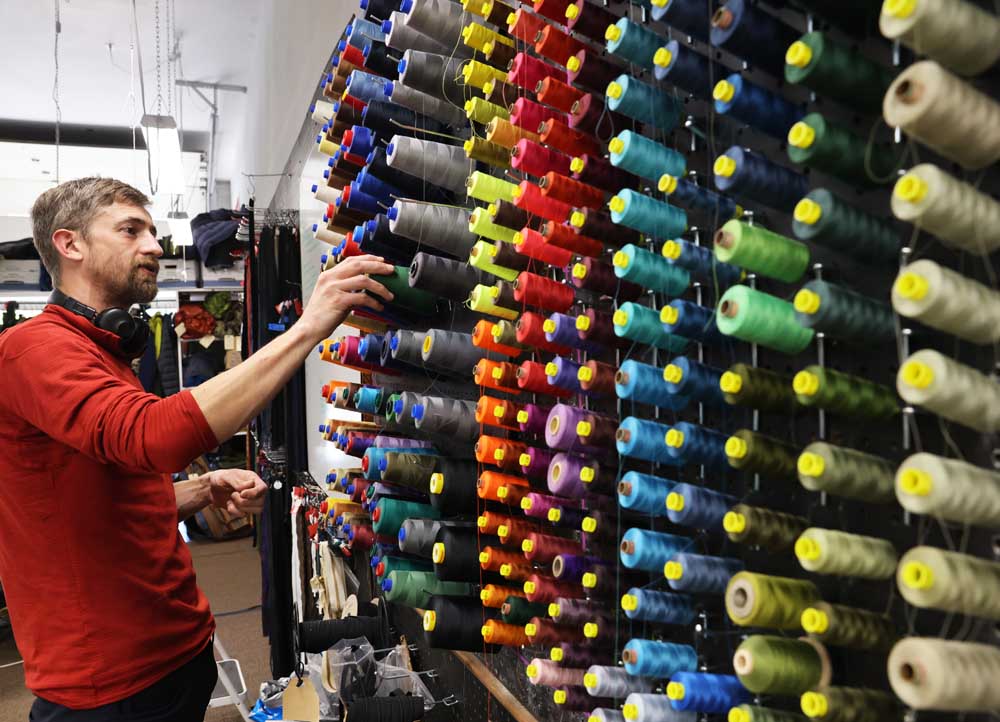Rugged Thread in Bend stitches up savings
Published 3:00 pm Friday, May 20, 2022

- Seamster, Sam Powell matches threads for a project at Rugged Thread in Bend.
When down feathers started drifting out of the burn hole on the sleeve of Nancy Wathen’s puffy jacket, she thought the jacket was ready for the trash bin.
The jacket, while not a designer label or expensive, was Wathen’s favorite: Comfortable, the right fit and bright orange.
For two years, she walked around with the hole, covered with tape, until she took it to Rugged Thread, an outdoor soft-goods repair shop in Bend. She asked if they could repair the hole and replace the lost down feathers.
“I picked it up a few days ago, and you can’t tell where the patch was on the inside or the outside,” said Wathen, a Bend resident. “It’s the most incredible thing. I’ll be able to keep wearing it for another couple of years now.”
For outdoor enthusiasts, reusing, recycling and repairing is a way to reduce what goes into landfills.
It’s also a core value for Rugged Thread, said Kim Kinney, company founder. Reusing and repairing is one way to protect the environment by not having to produce new goods using new materials.
Rugged Thread repairs everything from jackets like Wathen’s, to tents, sleeping bags, backpacks, really anything that’s got fabric on it, Kinney said. Like a lot of businesses in Bend, Rugged Thread started out in Kinney’s garage with just herself and her sewing machine. She started with repairing her friends’ outdoor equipment and grew it into a home-based business for about six years.
Today, she has six employees working full-time in a warehouse on NE Twin Knolls Drive. She has carved out a unique operation for her business, mixing individual clients like Wathen and the U.S. Forest Service and REI in Bend, which seek out her expertise to make repairs. Before the pandemic, about 60% of her sewing repair business came from other businesses sending her work for repair.
Now, the bulk of her business comes from individuals in Bend and from across the country, Kinney said.
“Maybe more people go outside more and used their gear,” she said. “With the supply chain issues and manufacturing not having access to raw materials, new products are becoming more expensive. So people seem to be looking at repairing rather than buying now.”
The outdoor products industry is a $400 billion a year business. Kinney’s belief is if she can repair just 1% of the items for one person, that means fewer items headed to the landfill.
With every repair, Rugged Thread takes pride in the knowledge that it is protecting the environment by reusing an item. Over the years, Kinney estimates she has kept 15,000 pounds of outdoor equipment from going to the landfill from the 6,000 items her company has repaired.
Many outdoor gear companies have used gear, or trade-in stores, for their products.
REI has a section on its website. Patagonia’s reuse, recycle marketplace, called WornWear, estimates that in 2021 the program kept 72,786 pounds of gear from going to a landfill, according to the company. Patagonia also has an online or ins-store mechanism for can recycle clothing by going to wornwear.patagonia.com/faq.
The reuse, recycle and reduce mantra that many outdoor enthusiasts embrace serves the outdoor community well, said Todd Laurence, an Oregon State University-Cascades business instructor. Some outdoor enthusiasts see reusing, recycling and restoring as a way to protect the environment. “Companies like Rugged Thread are doing a good business and growing by serving the group of consumers who don’t want to be throwing things away,” Laurence said. “There’s an economic interest in all this.” The U.S. Environmental Protection Agency says that recyclable materials like rubber, leather and textiles comprised about 14.7% of the solid waste in 2018, with 2.5 million tons recycled.
Within this figure, the EPA estimated that the recycling rate for textiles in clothing and footwear was 13%, based on information from the American Textile Recycling Service.
“The cycle of renew and recycle ethos is strong with people who are biased toward this,” Laurence said.
In Bend there are other ways to recycle, like at consignment stores or on social media marketplaces, he said. Those can net some income and lower barriers for entry to a new sport, he said.
Like other businesses that employ craftsmen, Kinney has had trouble finding experienced sewers. The training is rigorous and takes about a year, she said. “Sewing is a dying craft,” Kinney said.
“We repair a lot of high-risk, high-dollar items. We’re crafts people. No two repairs are the same. It’s challenging to find sewers. We pay family wages.”






